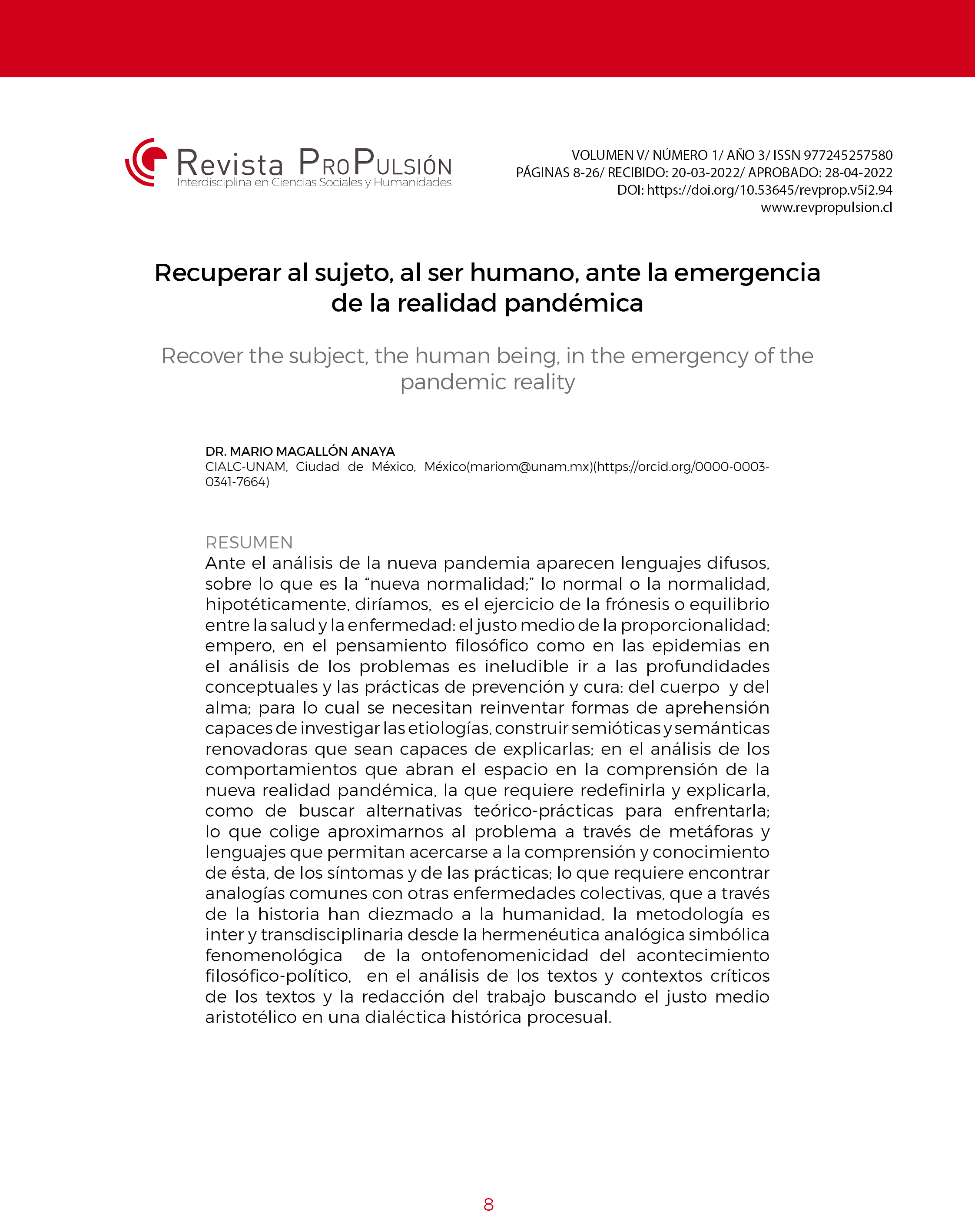Recuperar al sujeto, al ser humano, ante la emergencia de la realidad pandémica
DOI:
https://doi.org/10.53645/revprop.v5i2.94Keywords:
subject, pandemic, health, illness, ethics, freedomAbstract
Before the analysis of the new pandemic, diffuse languages appear, about what is the “new normality;” what is normal or normality, hypothetically, we would say, is the exercise of phronesis or balance between health and disease: the fair mean of proportionality; however, in philosophical thought as in epidemics in the analysis of problems it is unavoidable to go to the conceptual depths and practices of prevention and cure: of the body and of the soul; for which it is necessary to reinvent forms of apprehension capable of investigating the etiologies, building semiotics and renovating semantics that are capable of explaining them; in the analysis of the behaviors that open the space in the understanding of the new pandemic reality, which requires redefining and explaining it, as well as seeking theoretical-practical alternatives to face it; what it takes to approach the problem through metaphors and languages that allow approaching the understanding and knowledge of it, of the symptoms and of the practices; which requires finding common analogies with other collective diseases, which throughout history have decimated humanity, the methodology is inter and transdisciplinary from the phenomenological symbolic analogical hermeneutics of the ontophenomenicity of the philosophical-political event, in the analysis of the texts and critical contexts of the texts and the writing of the work looking for the Aristotelian middle ground in a procedural historical dialectic.
Downloads
References
Baudrillard, Jean. (2001), La guerra del Golfo no ha tenido lugar, Editorial Anagrama.
Foucault, Michel. (1966). El nacimiento de la clínica. Una arqueología de la mirada médica. Siglo XXI.
Foucault, Michel. (1987). Hermenéutica del sujeto. Las ediciones de la Piqueta.
Foucault, Michel. (2002). La hermenéutica del sujeto. Curso en el College de France (1981-1982). FCE.
Hegel G. F. (1975). Filosofía del derecho. UNAM.
Hegel G. F. (1968). Enciclopedia de las ciencias filosóficas en compendio. Para uso de sus clases. Alianza Universidad.
Nietzche, Friedrich. (2017) Sobre verdad y mentira en sentido extramoral y otros fragmentos de la filosofía de conocimiento. Tecnos,
Prieto, Laura Cristina. (2021). Pandemia: a 500 años de la Caída de Tenochtitlán, Tangerinas y cetáceos, 05 de agosto, en https://tangerinasycetaceos.wordpress.com
Roig, Arturo Andrés. (1973). Bases metodológicas para el tratamiento de las ideologías, en Hacía una filosofía de la liberación latinoamericana. Editorial Bonum.
Skolimowski, Henryk. (2017). Filosofía viva: La ecofilosofía como árbol de la vida. Atlanta.
Sloterdijk, Peter. (2013). Muerte aparente del pensar. Sobre la filosofía y la ciencia como ejercicio. Unseld Lecture. Siruela.
Ulrich, Peter. (2006). Ética y economía mundial. Una perspectiva ético-económica, en Hans Küng y Karl-Josej Huschel (editores), Ciencia y ética mundial. Editorial Trotta.

Published
How to Cite
Issue
Section
Categories
License
Copyright (c) 2022 Mario Magallón

This work is licensed under a Creative Commons Attribution-NonCommercial 4.0 International License.
- Esta licencia permite a los reutilizadores distribuir, remezclar, adaptar y construir sobre el material en cualquier medio o formato solo con fines no comerciales, y solo mientras se dé atribución al creador.Incluye los siguientes elementos: POR – Se debe dar crédito al creador NC – Solo se permiten usos no comerciales de la obra.







